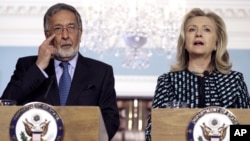The United States says it is committed to Afghanistan and that the security transition is on track, despite recent setbacks.
Secretary of State Hillary Clinton said Wednesday that even with obstacles in the past few months and the "difficult days" that lie ahead, both nations will work together to ensure a stable and secure future for the Afghan people.
She did not specify the setbacks, but there have been a series of deadly attacks on international forces by their Afghan counterparts recently.
Clinton made the remarks in Washington alongside Afghan Foreign Minister Zalmai Rassoul, as the two launched the U.S.-Afghan Bilateral Commission. Rassoul said his country is fully committed to "shared sacrifices" and taking on the challenges ahead.
The bilateral commission will implement the strategic partnership agreement signed by the United States and Afghanistan in May of this year.
The strategic deal outlines the future relationship between the two countries, as U.S. combat troops complete their withdrawal from Afghanistan by the end of 2014.
The agreement covers cooperation in the areas of security, economic development and governance. It does not commit the U.S. to any specific troop presence, but pledges American aid for Afghanistan for at least a decade after international combat troops leave the country. An unspecified number of U.S. military personnel are expected to remain in Afghanistan to continue training and advising Afghan security forces.
Both countries also are expected to begin negotiations on a Bilateral Security Agreement that will supersede the current Status of Forces Agreement.
Clinton said U.S. Deputy Representative to Afghanistan and Pakistan James Warlick will lead the negotiations on the American side. Rassoul noted that Afghan Ambassador to the U.S. Eklil Hakimi will lead the process on Afghanistan's behalf.
The secretary of state noted that "despite the headlines," the U.S. and Afghanistan have made headway in a number of areas, including health, education, and women's rights. She said electricity has been brought to parts of Afghanistan that had never seen it before.
Clinton added that Afghan forces increasingly are capable of taking on responsibility for their nation's security and that Afghan President Hamid Karzai has put forth an agenda for a number of political reforms.
Rassoul said the Afghan government will continue to "vigorously" pursue the peace process, work to combat corruption, build infrastructure and ensure good governance. He said Afghanistan also will continue to promote the rights of Afghan women and girls.
Secretary of State Hillary Clinton said Wednesday that even with obstacles in the past few months and the "difficult days" that lie ahead, both nations will work together to ensure a stable and secure future for the Afghan people.
She did not specify the setbacks, but there have been a series of deadly attacks on international forces by their Afghan counterparts recently.
Clinton made the remarks in Washington alongside Afghan Foreign Minister Zalmai Rassoul, as the two launched the U.S.-Afghan Bilateral Commission. Rassoul said his country is fully committed to "shared sacrifices" and taking on the challenges ahead.
The bilateral commission will implement the strategic partnership agreement signed by the United States and Afghanistan in May of this year.
The strategic deal outlines the future relationship between the two countries, as U.S. combat troops complete their withdrawal from Afghanistan by the end of 2014.
The agreement covers cooperation in the areas of security, economic development and governance. It does not commit the U.S. to any specific troop presence, but pledges American aid for Afghanistan for at least a decade after international combat troops leave the country. An unspecified number of U.S. military personnel are expected to remain in Afghanistan to continue training and advising Afghan security forces.
Both countries also are expected to begin negotiations on a Bilateral Security Agreement that will supersede the current Status of Forces Agreement.
Clinton said U.S. Deputy Representative to Afghanistan and Pakistan James Warlick will lead the negotiations on the American side. Rassoul noted that Afghan Ambassador to the U.S. Eklil Hakimi will lead the process on Afghanistan's behalf.
The secretary of state noted that "despite the headlines," the U.S. and Afghanistan have made headway in a number of areas, including health, education, and women's rights. She said electricity has been brought to parts of Afghanistan that had never seen it before.
Clinton added that Afghan forces increasingly are capable of taking on responsibility for their nation's security and that Afghan President Hamid Karzai has put forth an agenda for a number of political reforms.
Rassoul said the Afghan government will continue to "vigorously" pursue the peace process, work to combat corruption, build infrastructure and ensure good governance. He said Afghanistan also will continue to promote the rights of Afghan women and girls.





